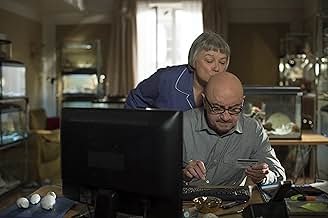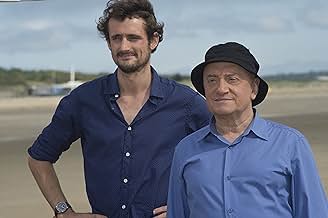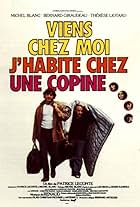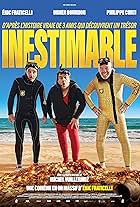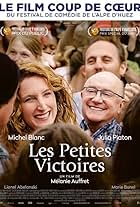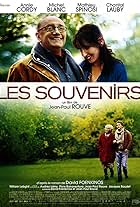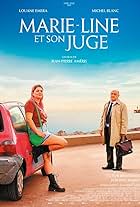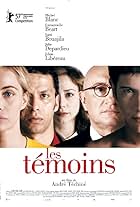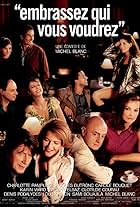This film exceeds all possible praise. It stars Josiane Balasko, was directed by her, from a story by her, and co-scripted by her. Balasko is a much-loved fixture of the French cinema, a character actress who can readily play a lead role and command the screen effortlessly with her incomparable magnetism and sheer genius. Many people will remember how sensational she was as the concierge in the brilliant film THE HEDGEHOG (LE HÉRISSON, 2009, which alas I did not review). Here she excels herself in one of the greatest screen performances of the French cinema in recent years. In the film she plays a woman named Nenette who in England we would call 'simple', though in America she would be called 'mentally retarded'. She has none of the social niceties about her, being entirely unaware of them. She laughs, she cries, she runs up to people and throws her arms around them, she sobs, she runs after people in the street, and she cannot for any reason be parted even for a moment from her beloved pet tortoise (called 'Tootie' in the English subtitles), whom she continually kisses on the nose and carries with her at all times in her awful plastic handbag. She is a bulky adult with a mental age of about six. But she is overwhelmingly loving and lovable. Balasko uses this character to make some points about our lives and our society today. Balasko's naïve and trusting nature defeats all the sourness, selfishness, misunderstandings, and insularity of countless characters in the story. She wins them over and transforms their lives. The film is blatantly a morality tale. But it is also a warm-hearted lesson in the power of uncomplicated and spontaneous love. The film inextricably mixes outrageous hilarity and uncontrollable laughter with pathos, grief, and deep sadness. It is an emotional roller-coaster. One minute we are crying at how sad things are, and the next minute we are weeping with laughter. Balasko's direction (this is the eighth feature film which she has directed, though she has written 22 films and acted in 80) is so professional and inspired, that she is right up there with Agnes Varda in terms of directorial talent. She always knows the right angle, the right frame, how close to go, when a cutaway of the tortoise eating its lettuce is needed, and when Nenette should make a sad face and start crying like a child (only to cheer up moments later and run and hug someone). The film is never for a moment forced or artificial, but it is always convincing and genuine. The story begins when Nenette's mother has died, and she is left alone, and the house has to be sold. The social worker puts her in a 'home' where they want to take her tortoise away, so she flees and starts walking to the town of Angers, which is many, many miles distant. The reason for this is that she had been shown a photo album in which she found a photo of her mother and father, who had been unmarried. She had never known her father's name before. With the photo is an envelope containing a letter from him, and giving his address in Angers. So to her simple mind, it is perfectly obvious that she must go to find her Papa, whom she already uncontrollably loves without ever having met him. She is given a lift by some pop singers and deposited at the correct address, which is a pharmacy shop run by a sour man who is not very pleased to see her enter his shop, as she cuts a rather embarrassing figure. She says she has come to see Monsieur Berard, but the man informs her that he died 15 years ago. He then happens to mention that he is his son. She throws her arms around him and says he is her brother. He is horribly embarrassed in front of his staff and customers and horrified at such an open display of emotion, but above all, mortified to have a woman who is simple-minded turn up and claim to be his sister. She shows him the photo of her papa and the letter, and he realizes it is all true. The story goes on from there, getting more and more complex, with countless hilarious and sad incidents, the man's ex-wife, his estranged son, and endless family complications. The script is very ingenious and works very well. A wonderful performance is given by Michel Blanc as the brother. It is rare to find such a deft mixture of pathos and comedy in a film. If made in America, this tale would have dissolved into a viscous sea of over-sentimentality and slapstick, and consequently would have failed miserably. But the French are more sophisticated than that. Josiane Balasko has pulled it off. It is a truly wonderful and uplifting film.



